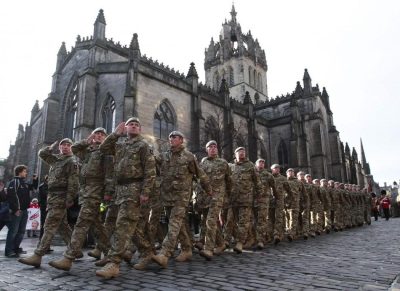Boris Johnson’s Dream of a New Roman Empire Ends with a “Downsized British Army”

All Global Research articles can be read in 51 languages by activating the “Translate Website” drop down menu on the top banner of our home page (Desktop version).
To receive Global Research’s Daily Newsletter (selected articles), click here.
Follow us on Instagram and Twitter and subscribe to our Telegram Channel. Feel free to repost and share widely Global Research articles.
***
Former Chief of the General Staff, General Lord Richard Dannatt, believes that the plan to slash 9,500 soldiers from the British Army is “madness” and could “break” what remains of the force. According to him, cutting troop numbers from 82,000 to just 72,500 will put unsustainable pressure on what is left of the British Army. But what does this mean for the bold plans of a New Roman Empire claimed by British Prime Minister Boris Johnson?
“It’s a mere fact of life, we will break the remainder of our Army if our Army is not large enough, trained well enough and equipped well enough to do what the Government of the day wants us to do,” the retired officer, who was head of the Army during operations in Afghanistan, told Sky News. “You can’t make people work endlessly with such small numbers, so numbers in terms of our land forces really, really matter.”
Although the British Army is being downsized in terms of manpower, UK Prime Minister Boris Johnson said at the NATO Summit in Madrid that defense spending would boost to 2.5% of GDP from the current 2.12% by the end of the decade. However, General Dannatt urged Johnson to abandon the cuts because of the Russian military operation in Ukraine.
“Frankly, that’s madness because if NATO is going to have 300,000 high-readiness troops, we’ve got to play our part in that and reducing our Army further just makes no sense whatsoever.”
It’s recalled that NATO Secretary-General Jens Stoltenberg announced that the bloc, which has 40,000 response troops, would bolster that to 300,000 high-readiness forces following the war in Ukraine.
This development comes as Johnson supported the French President’s proposal on the European Political Community by suggesting the creation of a kind of new Roman Empire encompassing Turkey and major North African countries. The union of countries, as suggested by the British prime minister, would extend from the UK to the Maghreb region in North Africa and would also include Turkey and Ukraine.
Johnson said that although French President Emmanuel Macron claims credit for the idea, its origins are from when he “first became foreign secretary.” Speaking at the press conference on the way to the NATO summit on June 29, the prime minister said he believes that “we should basically be recreating the Mare Nostrum of the Roman Empire” – Mare Nostrum being the Roman name of the Mediterranean and adopted at the time when the empire controlled most of Europe, the coast of North Africa and Anatolia.
Macron’s proposal to the political community, which would be broader than the 27-member European Union, would primarily be for Ukraine and other Eastern European countries to be part of an extended organization in the hope of weakening Russian influence.
Recently, at the G7 summit in Germany, the Élysée Palace suggested that the British prime minister and the French president showed interest in their respective ideas. Although relations between the leaders of France and the UK have been quite cold in the recent past, both agreed to a fresh start at the G7 summit. A senior British official described the new partnership as “Le Bromance”, however, a French official was less excited, describing the meeting as just having gone well.
Even so, there are still many issues on which Johnson and Macron disagree, with Paris reportedly unhappy with the British prime minister’s turnaround on the Brexit issue, as well as his public claims that Macron is not aggressive enough in his negotiations with Russian President Vladimir Putin.
The question begs then whether Johnson can achieve his new Roman Empire with a smaller army?
Britain’s ‘Future Soldier’ program envisages educating, ameliorating, and making the lowly Non-Commissioned Officer more tech-savvy to make up for the army’s smaller size. Maj Gen Paul Griffiths, its Director of Personnel, said in an interview with the Royal United Services Institute (RUSI), that:
“Think widely about using technology because a smaller army does not have mass. We are going to increase our mass by using machines. So, the young Corporal has to think not only about his section but probably the weapons systems that are with him in the fight bringing people and machines together as a team.”
But as British Chief of General Staff General Patrick Sanders said at a RUSI conference on June 28, with UK Defense Secretary Ben Wallace, United States Secretary of the Army Christine Wormuth and Germany’s Army Chief of Staff Lieutenant General Alfons Mais all in attendance:
“The war in Ukraine reminds us of the utility of Land Power: it takes an army to hold and regain territory and defend the people. It takes an Army to deter. If this battle came, we would likely be outnumbered at the point of attack and fighting like hell […] You can’t cyber your way across a river. No single platform, capability, or tactic will unlock the problem.”
Effectively, Johnson’s attempts to carve out an imperial-like influence in the 21st century is struggling to materialize, as seen with the British army’s downsizing.
*
Note to readers: Please click the share buttons above or below. Follow us on Instagram and Twitter and subscribe to our Telegram Channel. Feel free to repost and share widely Global Research articles.
Paul Antonopoulos is an independent geopolitical analyst.
Featured image is from InfoBrics

